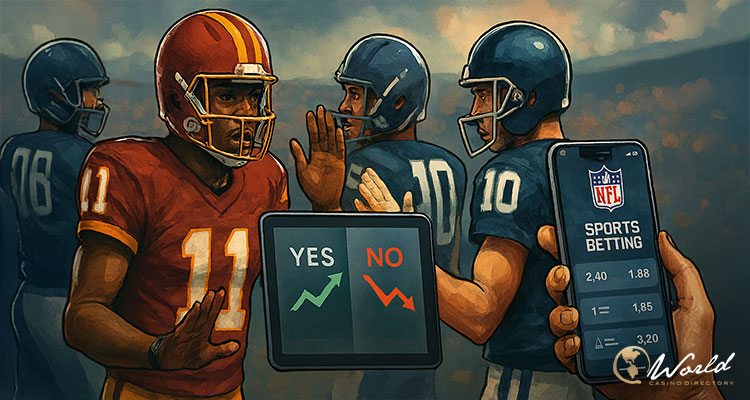The National Football League (NFL) has issued a clear directive banning players and staff from using federally regulated prediction markets to wager on NFL games. The league emphasized that these platforms, which operate under the oversight of the Commodity Futures Trading Commission (CFTC), are considered equivalent to traditional sports betting when it comes to league policy.
NFL’s Stance on Prediction Markets
During a media briefing on Monday, August 25, Sabrina Perel, the league’s Chief Compliance Officer, confirmed the updated interpretation of the NFL’s gambling policy. “Our view is that these platforms mimic sports betting and that they are covered as prohibited conduct under our policy, and that would be for all of our personnel,” Perel stated. “And now we’re educating on this point as well, specifically stating that … engaging in these platforms would be prohibited under the policy.”
The clarification comes as prediction markets, such as Kalshi and Robinhood, expand their offerings of sports event contracts, including those tied to professional and college football. These markets, which resemble stock exchanges for sports outcomes, have grown rapidly, providing nationwide access to event-based betting — even in states where traditional sports betting remains illegal.
Alex Riethmiller, NFL vice president of communications, added further clarity, noting that players may still engage with prediction markets for non-NFL events, provided they do not place bets while at work or during team travel. “NFL players could participate in prediction markets in sports other than the NFL and as long as they aren’t doing it at work or on a work trip,” Riethmiller explained. “In that way, it mirrors the policy for regular sports betting.”
David Highhill, the NFL’s vice president of sports betting, expressed ongoing concerns about the lack of regulatory oversight and transparency in federally regulated prediction markets compared to state-regulated sportsbooks. “I think what’s important about the sports betting markets right now that are legal is that they have robust protections that include information sharing between sportsbooks and the leagues,” Highhill said, as reported by Covers. “There’s integrity monitoring requirements, there’s prohibitions on certain types of wagers or markets that are more subject to influence.”
According to Highhill, the absence of integrity monitoring, official data usage requirements, and responsible betting safeguards in prediction markets creates vulnerabilities, including risks of manipulation and price distortion. “For us, the key distinction is that, for now, prediction markets lack certain regulatory requirements that we know regulated sportsbooks are subject to, like information sharing, responsible betting tools, (and) the objectionable bet prohibitions,” he said.
The NFL previously raised these issues with the CFTC, submitting a formal letter in 2024 that outlined potential integrity risks if these platforms remained unregulated.
Policy Enforcement and Industry Reactions
Under the league’s existing gambling policy, players are prohibited from betting on NFL games or entering sportsbooks during the season. Coaches, executives, and other personnel face even stricter rules, as they are barred from wagering on any sport altogether. Prediction markets will now be enforced under the same restrictions, extending those boundaries to these newer platforms.
Kalshi responded to the NFL’s position, noting that it operates under stringent federal oversight. A company spokesperson said: “Kalshi goes even further to operate with the highest level of integrity, launching responsible trading features such as deposit limits and self-exclusion, and partnering for additional oversight with compliance firm IC360, which works with every major league and sportsbook. We are committed to working with the NFL and all leagues to address their concerns, share data, and be as transparent as we are legally allowed to be.”
Beyond prediction markets, the NFL reiterated its opposition to certain types of bets, particularly microbets that can be controlled by a single player, such as whether a kicker will miss a field goal. Highhill explained that these wagers carry a heightened risk of manipulation and minimal engagement value. “We’ve been consistent with those over the years,” he said, adding that the league continues to collaborate with operators to eliminate these types of betting markets.
The league also addressed the importance of safeguarding players, as there have been instances of harassment linked to gambling outcomes. While not every case stems from sports betting, NFL Security and law enforcement have systems in place to investigate and ban individuals who pose threats to players.



